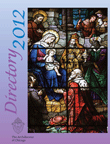Sister offers guide to teaching on Holy Orders

A regular feature of The Catholic New World, The InterVIEW is an in-depth conversation with a person whose words, actions or ideas affect today's Catholic. It may be affirming of faith or confrontational. But it will always be stimulating.
Sister Sara Butler, a Missionary Servant of the Most Blessed Trinity, was once a supporter of ordaining women to the Catholic priesthood. But over time, and with much study, Butler came to understand the teaching that the church has no authority to ordain women as priests.
She explains this in “The Catholic Priesthood and Women: A Guide to the Teaching of the Church,” (Hillenbrand Books, Liturgy Training Publications, 2007). The slim volume (122 pp., including the index) explains the theology of the sacrament of holy orders and responds to several commonly raised objections to the idea that the church cannot ordain women to the priesthood. Butler, a professor of dogmatic theology at St. Joseph’s Seminary in New York, also was on the canonical faculty at the University of St. Mary of the Lake/ Mundelein Seminary. She was one of the first two women appointed by Pope John Paul II to the International Theological Commission. She spoke by telephone with staff writer Michelle Martin.
- The Catholic New World:
Sister Sara Butler:Why did you write this book?
It was primarily for seminarians and theology students who didn’t live through the feminist movement and the controversy over this question, who sometimes are puzzled by the discussion and by dissent. I wanted them to understand what happened and why. It’s also for people who question the church’s teaching, to give them an opportunity to rethink their objections. Seeing it laid out in an orderly way, they might think it through again and find it possible to accept it.
- TCNW:
SSB:According to the introduction to the book, you originally supported the idea of women’s ordination. What made it seem to you like a good or necessary thing?
It just seemed logical to me that the priesthood should be open to women. I was thinking of it from the perspective of the feminist movement and women’s right to have access to public leadership roles. Many theologians at the time said there was no theological obstacle, so I really just went along with them.
- TCNW:
SSB:What started to change your thinking on the issue?
It wasn’t any one moment or insight, but rather just gradually coming to a deeper understanding of what the church documents on the topic actually claimed. I reviewed them over and over again in various different groups that I belonged to. It was in ecumenical dialogue, in fact, that I discovered how the Catholic doctrine of the priesthood as a sacrament plays into this. The church says we don’t have the authority to change this.
To say you don’t have the authority to change it implies that it was something given by Christ, instituted by Christ, that the church doesn’t have charge of.
The priesthood is a gift of Christ, not just a role of public leadership. That didn’t hit home with me at first. It took a long time to understand the implications of that.
- TCNW:
SSB:Why is this so divisive? Or is it becoming less divisive?
It’s divisive because our culture can’t understand it. It doesn’t compute with our understanding of equality. People don’t understand—they may not accept the Catholic doctrine of the priesthood, which is a matter of faith—and so they assume it is a public leadership role to which women should have equal access.
I think for younger people, it’s not such an issue, but for many Catholics who went through the feminist debates of the last part of the 20th century, it remains a stumbling block.
It’s not about whether women should be eligible for traditionally male roles. It’s about whether Christ, when he called the apostles, intended to establish the male priesthood as a norm for the church. The bottom line is, what is the will of Christ for the priesthood?
- TCNW:
SSB:What do you say to people who argue that Christ only called men because women simply didn’t have public roles at the time?
That’s an important question. It’s actually feminist scholarship that gives us evidence that Jesus Christ broke with the conventions of his time in terms of his public dealings with women—including them in his company and teaching them and giving them responsibility for spreading the Good News. He was free to call women to the apostolic ministry, and the fact that he didn’t do so gives us an indication of his will. That’s what the tradition tells us. In the early church, when some communities ordained women priests, their practice was rejected as unfaithful to the will of Christ.
- TCNW:
SSB:What can the church do to make it understood that it does not view women as having lower status because of this?
First of all, you have to clear away the misunderstanding that the debate is about the status of women. Many people have heard the objections but never studied the church’s teaching.
Second, you have to explain more fully the meaning of holy orders, and how the Catholic doctrine on the priesthood differs from the common Protestant view of the ordained ministry. Many Catholics haven’t given much thought to the nature of the sacraments.
- TCNW:
SSB:So what you’re advocating is better catechesis?
Yes, I would advocate better catechesis on Holy Orders as a sacrament. That would help.





